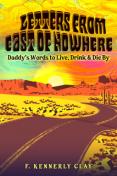
“My father’s mugshots are strewn all over the internet…”
So begins this gritty and intimate memoir that unveils the unmistakable, indelible love between a woman and the father she knows almost entirely from a cache of letters sent from a lifetime on the road.
Letters from East of Nowhere is a deeply personal tale about the consequences of a life free of commitments against a backdrop of wandering, music, and overindulgence. It was the free-spirited lifestyle romanticized in Jack Kerouac’s 1957 novel On the Road that beckoned to Kennerly Clay’s father, which also led him to a lifetime of failed relationships, mishaps with the law, and a never-ending struggle with alcoholism. Aside from booze, his only constant was a passion for the written word, and throughout the years he sent letters, poetry, and expressions of his undying love for his children.
While Kennerly paints an earnest portrait of her father, at the heart of this story is a tale of inspiration and personal discovery, the uncovering of some of life's more important moments that were lost in her childhood, and others newly found. It's an unflinching reckoning with the wake that ripples through a family when one is gripped in the clutches of addiction.
In the writing of Letters from East of Nowhere, Kennerly Clay has found her own voice, delivering a wonderfully honest reflection on life, on the passionate craziness of the Sixties, and on learning to love a father who would always choose alcohol over everything else.
Get your copy of LETTERS FROM EAST OF NOWHERE today
Book Details
Genre:
- Nonfiction
Age Level:
- Adult






